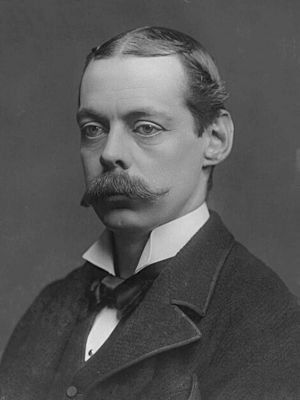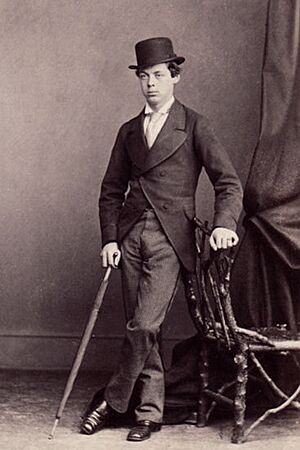Lord Randolph Churchill facts for kids
Quick facts for kids
Lord Randolph Churchill
|
|
|---|---|
 |
|
| Chancellor of the Exchequer | |
| In office 3 August 1886 – 22 December 1886 |
|
| Prime Minister | The Marquess of Salisbury |
| Preceded by | William Vernon Harcourt |
| Succeeded by | George Goschen |
| Leader of the House of Commons | |
| In office 3 August 1886 – 14 January 1887 |
|
| Prime Minister | The Marquess of Salisbury |
| Preceded by | William Ewart Gladstone |
| Succeeded by | William Henry Smith |
| Secretary of State for India | |
| In office 24 June 1885 – 28 January 1886 |
|
| Prime Minister | The Marquess of Salisbury |
| Preceded by | The Earl of Kimberley |
| Succeeded by | The Earl of Kimberley |
| Personal details | |
| Born |
Randolph Henry Spencer-Churchill
13 February 1849 Belgravia, London, England |
| Died | 24 January 1895 (aged 45) Westminster, London, England |
| Political party | Conservative |
| Spouse |
Jennie Jerome
(m. 1874) |
| Children | Sir Winston Spencer-Churchill John Spencer-Churchill |
| Parents | John Spencer-Churchill, 7th Duke of Marlborough Lady Frances Anne Vane |
| Education | Cheam School Eton College |
| Alma mater | Merton College, Oxford |
| Profession | Politician |
Lord Randolph Henry Spencer-Churchill (born February 13, 1849 – died January 24, 1895) was an important British politician. He was the father of Winston Churchill, who later became a famous Prime Minister. Randolph was also the son of the 7th Duke of Marlborough.
Contents
Early Life and Education
Randolph Spencer-Churchill was born in Belgravia, London. He was the third son of the Marquess of Blandford, who later became the 7th Duke of Marlborough. Because he was a younger son of a Marquess, he was known by the courtesy title Lord Randolph Churchill. This also meant he could serve in the House of Commons, which is part of the British Parliament.
Young Randolph went to Tabor's Preparatory School and then to Eton College from 1863 to 1865. He wasn't known for being the best student or athlete at Eton. However, he was a lively and sometimes mischievous boy. He made lasting friendships there with people like Arthur Balfour and Archibald Primrose, who also became important figures later on.
In 1867, Churchill started studying at Merton College, Oxford. He sometimes got into trouble for being rowdy. Even so, he enjoyed hunting and was very well-read, especially in history. He earned a good degree in law and modern history in 1870.
Political Career
In 1874, Lord Randolph Churchill was elected to Parliament. He became a Conservative Member of Parliament (MP) for Woodstock, which was close to his family's home, Blenheim Palace. His first speech in Parliament was well-received, even by important politicians like Benjamin Disraeli.
After 1880, he became more active in Parliament. By 1885, he had developed his own political ideas, which he called "Tory Democracy". This idea suggested that the Conservative Party should support popular reforms instead of always opposing them. He believed Conservatives should show they cared about ordinary people, just as the Liberal Party claimed to do. His ideas helped shape how the Conservatives dealt with new laws, like the Representation of the People Act 1884, which gave more men the right to vote. He also created the term One-nation conservatism, which means that all parts of society should work together.
Secretary of State for India
In June 1885, Churchill was given a very important job: Secretary of State for India. This meant he was in charge of how the British government managed India.
During his time in this role, Churchill made decisions that favored British trade over Indian goods. He also increased spending on the Indian Army. This meant less money was available for important public projects in India, like building railways, roads, and irrigation systems. He also moved money that was meant for future famine relief to help balance his budget. He did not support reforms that would have given Indian people more representation in the government or army.
One of his most significant actions was his role in the invasion of Burma. In November 1885, he directed the Viceroy, Lord Dufferin, to invade Upper Burma. After a quick war, Churchill decided to add Burma as a new province of the Indian Raj. This happened on New Year's Day 1886. The war and the ongoing fighting afterwards ended up costing a lot more money than Churchill had first estimated.
End of Political Career
Lord Randolph Churchill was new to the top levels of government and felt a bit alone in the cabinet (the group of top ministers). He believed his strong public support would allow him to make decisions about the country's finances and foreign policy. He wanted to show that the Conservatives could save money, just like the Liberal leader Gladstone.
So, he suggested a budget that cut a lot of spending. This surprised many Conservative MPs. He pushed for even bigger cuts to the Army and Navy, which worried the ministers in charge of those areas. Churchill decided to resign, thinking the government would give in to his demands. However, the Prime Minister, Lord Salisbury, accepted his resignation. This was a big mistake for Churchill's career. George Goschen took his place as Chancellor. Although people wondered if he would return to a top role, Lord Randolph Churchill's main political career was over.
Even though he remained a Member of Parliament, his health began to get much worse in the 1890s. It became clear that an illness was affecting his abilities. By 1893, his speeches in Parliament were not as strong as they used to be. His last speech in the House of Commons was in June 1894, and it was a difficult moment for him.
Death
Lord Randolph Churchill tried to travel around the world in late 1894, hoping it would help his health. His wife went with him. However, he became too ill and had to return quickly from Cairo. He arrived back in England just before Christmas and passed away in Westminster the following month, at the age of 45.
He is buried near his wife and sons at St Martin's Church, Bladon, which is close to Woodstock, Oxfordshire.
Images for kids
-
Lord Randolph Churchill and Lady Randolph Churchill (Jennie Jerome) in Paris (1874) by Georges Penabert
See also
 In Spanish: Randolph Churchill para niños
In Spanish: Randolph Churchill para niños
 | William L. Dawson |
 | W. E. B. Du Bois |
 | Harry Belafonte |







